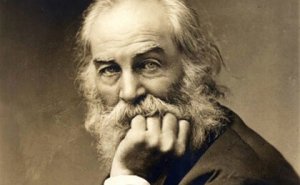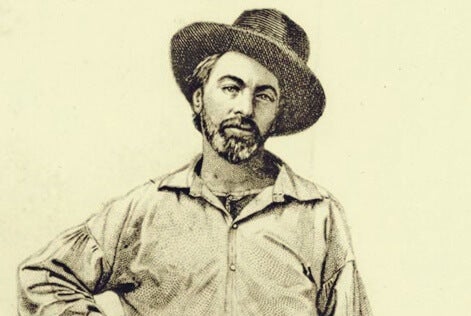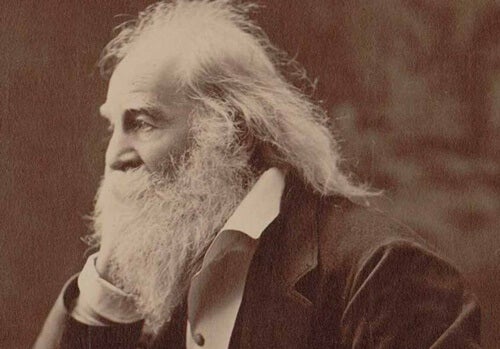Poet Whitman and His Enthusiasm for Life


Written and verified by the psychologist Valeria Sabater
The poet Walt Whitman was one of the most influential American writers. In fact, some people consider him the father of free prose. He was also an essayist and journalist, and even a nurse. His poems transmit passion, euphoria, and joy. They’re about love, sexuality, nature, and enthusiasm for life. He was, above all else, a humanist. In other words, he believed in freedom and inspired multiple generations. In fact, he still does with his works.
Known mainly for poem collections such as Leaves of Grass, Whitman was a prime example of someone capable of coping with adversity to achieve their dreams. In addition, he offered spiritual support to the soldiers of the Civil War. Unfortunately, shortly after, he was the victim of an attack that disabled him.
None of it affected his character or determination to shape the work for which he’s always been heavily criticized. Although he admired Keats, Shakespeare, and Emerson, nevertheless, he tried to find new expressive forms. Also, he was a journalist committed to the abolition of the death penalty and civil rights for many years.
He was a brave modern man. Someone who praised free verse, a style that’s sometimes wild and lacking in structure. Certainly the reflection of his own character. Thus, and although his wake collided with the puritan society that surrounded him and still linked to the strictest social conventions, he was able to do the sort of unique work that made history in the world of literature.
“I celebrate myself, and sing myself,
And what I assume you shall assume,
For every atom belonging to me as good belongs to you.”-Walt Whitman, Leaves of Grass–

Walt Whitman, a journalist turned poet
Whitman was born in 1819 in West Hills, New York. He was the second of nine children, the result of the marriage formed by Walter and Loisa Van Velsor. They were a family of Quakers who coped with the harshness of scarcity and economic problems throughout their lives.
However, little Whitman managed to rise up as a skilled self-taught young man. He got acquainted with the classics when he was very young and read Dante, Shakespeare, and Homer. Also, he was quickly captivated by literature and poetry.
He started working in a printing press at the age of 12. It was an ideal environment that allowed him to help his family and begin his later training as a teacher at the age of 17. After finishing his degree, and working for a while in various rural schools in Long Island, Walt Whitman began a decisive stage in his life: journalism.
The poet Walt Whitman and his commitment to social rights and freedom
After quitting his job as a teacher, Whitman returned to New York and established his own newspaper: The Long-Islander. He fulfilled the tasks of editor, journalist, and delivery man. In these publications, you can see the strokes of his Whitmanisms which later appeared in all his stories, verses, and letters, such as those he exchanged with Peter Doyle, his lover and life partner.
Likewise, it’s worth highlighting one of Whitman’s most outstanding characteristics: social commitment. He spoke about the need to abolish slavery, end the death penalty, and improve wages and social rights. His weekly circulation was remarkably successful, so it didn’t take him long to work on more newspapers until he found the best known of all, the Brooklyn Freeman.
Those profits allowed him to publish the first edition of Leaves of Grass in 1855. It was a set of 12 poems that Ralph Waldo Emerson praised at a later date. However, critics and readers only saw a careless, passionate, and even libertine style. This is because he exalted homosexuality and bisexuality, among other topics.
So much so, that the publication of the book brought him problems later on. With the arrival of the Civil War, Walt Whitman dedicated himself to caring for the wounded. He even trained as a nurse and later choose it as a profession long after the conflict ended. Although his dedication was appreciated, he was fired after the government discovered that he was the author of Leaves of Grass.

An era of shortage means more time for creation
Walt Whitman struggled to make ends meet in the following years. He took care of his brothers and sick mother. He got sporadic jobs and received help from other writers, friends from other states, and even from England. Although the last decades of his life weren’t easy, he never lost his enthusiasm and passion for writing and defending his ideas.
He continued to write and review many of his works and poems. In 1870, he settled in Camden, New Jersey, where he suffered a stroke that partially paralyzed him. This didn’t kill his spirit either. In fact, his book, Leaves of Grass, continued to be published with the help of his friends in 1876, 1881, and 1889.
His last publication was Good-bye, My Fancy! in 1891. He died on March 26, 1892, due to pneumonia, at the age of 72.
An advanced style for the era of the poet Walt Whitman
Along with Emily Dickinson, Walt Whitman was one of the most influential American poets. However, his work was completely despised and not understood during his time. In those years, it was quite a scandal that a poet didn’t care for rhyme, as he made use of a narrative style and free prose.
Furthermore, his most striking and censored work was about sex; exalting, for example, the beauty of loving both men and women equally. The world wasn’t yet ready for people like him. It wasn’t the time to tune in to his humanity, to that expression of nature that’s so intense, free, happy, and vital.
The poet Walt Whitman created new poetry for a new town and few understood it. His verses reflected pure and transparent words of what one feels to love, to embrace, to be aware of the company of another, of the greatness of loving oneself, of creating fairer realities.

Final notes
For this reason, reading his works and returning to the unique universe of his poems is to pay homage to him. Thus, it’s to celebrate with him all those messages that he left behind in his free prose. It’s to meet his art again as if he were talking to you face to face and heart to heart: “You will hardly know who I am or what I mean, But I shall be good health to you nevertheless, And filter and fiber your blood.”
All cited sources were thoroughly reviewed by our team to ensure their quality, reliability, currency, and validity. The bibliography of this article was considered reliable and of academic or scientific accuracy.
- Loving, Jerome (1999) Walt Whitman: The Song of Himself. University of California Press
- Reynolds, David S (1995) Walt Whitman’s America: A Cultural Biography. New York: Vintage Books
This text is provided for informational purposes only and does not replace consultation with a professional. If in doubt, consult your specialist.








